
 |
|
The Stepford Wives (2004) Cast: Nicole Kidman, Matthew Broderick, Bette Midler, Roger Bart, Glenn Close, Christopher Walken, Jon Lovitz, Faith Hill, Lorri Bagley, Matt Malloy, Robert Stanton, Dylan Hartigan, Mike White, Mary Beth Peil, Larry King 2004 – 90 minutes Rated: Reviewed by Dustin Putman, June 9, 2004. 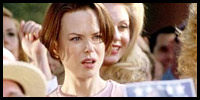 1975's "The Stepford Wives" (and the novel by Ira Levin from which it was based) were dark, unrelenting, and cynical, a comment on the post-Nixon era, when feminism was just breaking out and men were attempting to come to terms with their opposite sex's newfound liberation and independence. Today things are much different and these subjects, on their own, potentially date themselves. But do they really? Are there still husbands out there who secretly long for the days when their wife would stay at home and answer to their every domestic whim? Undoubtedly.
1975's "The Stepford Wives" (and the novel by Ira Levin from which it was based) were dark, unrelenting, and cynical, a comment on the post-Nixon era, when feminism was just breaking out and men were attempting to come to terms with their opposite sex's newfound liberation and independence. Today things are much different and these subjects, on their own, potentially date themselves. But do they really? Are there still husbands out there who secretly long for the days when their wife would stay at home and answer to their every domestic whim? Undoubtedly.
 With 2004's blackly comic remake of "The Stepford Wives," director Frank Oz (1999's "Bowfinger") and screenwriter Paul Rudnick (2003's "Marci X") have made a commendable effort in updating the same themes for modern audiences. And in place of the original's cynicism is a newfound hope that works well with its surprisingly irreverent humor. The film admittedly careens off the track during the protracted, overwritten climax (a probable result of post-production tinkering), but its weighty ideas and moralism remain intact despite its uneven treatment. Most accomplished of all, who knew that a motion picture about turning wives into robotic, obedient Martha Stewart clones could be so funny?
With 2004's blackly comic remake of "The Stepford Wives," director Frank Oz (1999's "Bowfinger") and screenwriter Paul Rudnick (2003's "Marci X") have made a commendable effort in updating the same themes for modern audiences. And in place of the original's cynicism is a newfound hope that works well with its surprisingly irreverent humor. The film admittedly careens off the track during the protracted, overwritten climax (a probable result of post-production tinkering), but its weighty ideas and moralism remain intact despite its uneven treatment. Most accomplished of all, who knew that a motion picture about turning wives into robotic, obedient Martha Stewart clones could be so funny?
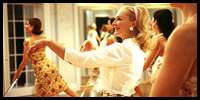 Joanna Eberhart (Nicole Kidman) is a high-powered, tough-as-nails CEO for a network specializing in reality TV who is devastated when, following a near-tragic run-in with a disgruntled participant from one of her shows, is abruptly fired. Desperate to put her life back together and reclaim her soul, Joanna and husband Walter (Matthew Broderick) decide a change of scenery is just what they need. Along with their two children, they move to the tranquil, upper-class gated community of Stepford, Connecticut. Almost immediately, Joanna senses something isn't quite right with the other women in the town. Always in clean dresses, uninterested in anything but cooking and cleaning, and dedicated to pleasing their mostly frumpy husbands, they are a too-perfect postcard image of a 1950's female stereotype. Meanwhile, the men of Stepford--Walter included--spend all of their time in secret at a men's association. But doing what? Along with her two new best pals and fellow black sheep, outspoken writer Bobbi Markowitz (Bette Midler) and fabulously gay architect Roger Bannister (Roger Bart), Joanna sets outs to investigate the bizarre goings-on in Stepford. Soon, she is fearing for her own life.
Joanna Eberhart (Nicole Kidman) is a high-powered, tough-as-nails CEO for a network specializing in reality TV who is devastated when, following a near-tragic run-in with a disgruntled participant from one of her shows, is abruptly fired. Desperate to put her life back together and reclaim her soul, Joanna and husband Walter (Matthew Broderick) decide a change of scenery is just what they need. Along with their two children, they move to the tranquil, upper-class gated community of Stepford, Connecticut. Almost immediately, Joanna senses something isn't quite right with the other women in the town. Always in clean dresses, uninterested in anything but cooking and cleaning, and dedicated to pleasing their mostly frumpy husbands, they are a too-perfect postcard image of a 1950's female stereotype. Meanwhile, the men of Stepford--Walter included--spend all of their time in secret at a men's association. But doing what? Along with her two new best pals and fellow black sheep, outspoken writer Bobbi Markowitz (Bette Midler) and fabulously gay architect Roger Bannister (Roger Bart), Joanna sets outs to investigate the bizarre goings-on in Stepford. Soon, she is fearing for her own life.
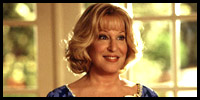 The premise of "The Stepford Wives," mixing sci-fi and horror elements, hardly seems like ideal comedic fodder. Walking into the film and with the chilling and predominately straight 1975 thriller freshly in mind, the concept of a humor-filled reimagining appeared less than promising. What was failed to be acknowledged was the participation of screenwriter Paul Rudnick, who has an innate gift in creating acerbic, modernistic dialogue. "The Stepford Wives" has its foreboding and appropriately serious moments, to be sure, but it is also overflowing with biting wit and quote-worthy one-liners. So, even though its plot and characters are taken in earnest, the film is never above taking hilarious potshots at contemporary society, from the ludicrousness of reality television to the legendarily slow-moving AOL Internet service. In taking broad comedic strokes amid the offbeat and downright outlandish, "The Stepford Wives" feels like a Tim Burton movie, by way of David Zucker. Even the atmospheric music score by David Arnold (2003's "2 Fast 2 Furious") borders on plagiarism of Burton's staple composer, Danny Elfman.
The premise of "The Stepford Wives," mixing sci-fi and horror elements, hardly seems like ideal comedic fodder. Walking into the film and with the chilling and predominately straight 1975 thriller freshly in mind, the concept of a humor-filled reimagining appeared less than promising. What was failed to be acknowledged was the participation of screenwriter Paul Rudnick, who has an innate gift in creating acerbic, modernistic dialogue. "The Stepford Wives" has its foreboding and appropriately serious moments, to be sure, but it is also overflowing with biting wit and quote-worthy one-liners. So, even though its plot and characters are taken in earnest, the film is never above taking hilarious potshots at contemporary society, from the ludicrousness of reality television to the legendarily slow-moving AOL Internet service. In taking broad comedic strokes amid the offbeat and downright outlandish, "The Stepford Wives" feels like a Tim Burton movie, by way of David Zucker. Even the atmospheric music score by David Arnold (2003's "2 Fast 2 Furious") borders on plagiarism of Burton's staple composer, Danny Elfman.
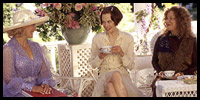 The ensemble cast is one of the most distinguished of the year. Nicole Kidman (2004's "Dogville"), so often seen in strictly dramatic roles, flexes her comic muscles with vigorous aplomb, making protagonist Joanna, who starts off the film as something of a wench, into a likable person. As friends Bobbi and Roger, Bette Midler (2000's "Isn't She Great?") and Roger Bart (1999's "The Insider") ravish their screen time and steal the show with their priceless line deliveries and self-deprecating humor. It is a particularly welcome return to film for Midler, who has been out of view for a few years. As Joanna's unhappy, gradually brainwashed husband, Walter, Matthew Broderick (1999's "Election") comfortably fits his role but comes off rather wimpy, which, in retrospect, was likely the point. The talented supporting players include Glenn Close (2001's "The Safety of Objects") as Claire, the cheerful leader of the Stepford wives; Christopher Walken (2004's "Man on Fire") as her daunting husband, Mike, the head of the men's association; and country star Faith Hill (in her feature debut) as Sarah, a frequently malfunctioning Stepford wife.
The ensemble cast is one of the most distinguished of the year. Nicole Kidman (2004's "Dogville"), so often seen in strictly dramatic roles, flexes her comic muscles with vigorous aplomb, making protagonist Joanna, who starts off the film as something of a wench, into a likable person. As friends Bobbi and Roger, Bette Midler (2000's "Isn't She Great?") and Roger Bart (1999's "The Insider") ravish their screen time and steal the show with their priceless line deliveries and self-deprecating humor. It is a particularly welcome return to film for Midler, who has been out of view for a few years. As Joanna's unhappy, gradually brainwashed husband, Walter, Matthew Broderick (1999's "Election") comfortably fits his role but comes off rather wimpy, which, in retrospect, was likely the point. The talented supporting players include Glenn Close (2001's "The Safety of Objects") as Claire, the cheerful leader of the Stepford wives; Christopher Walken (2004's "Man on Fire") as her daunting husband, Mike, the head of the men's association; and country star Faith Hill (in her feature debut) as Sarah, a frequently malfunctioning Stepford wife.
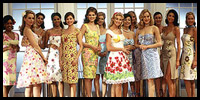 Sleekly shot by cinematographer Rob Hahn (2000's "Loser"), "The Stepford Wives" moves at a bright, fast clip for its first two-thirds, rarely faltering in its amalgamation of the mystery and comedy genres. The film is consistently funny for its first hour, and even allows for a few affecting quieter moments between Joanna and Walter. In trying to put its own twists on the story, however, the third act makes the wrong decision in overexplaining its story, the subsequent cause for some unnecessary plot holes. Director Frank Oz's sudden lost grip on how to wrap things up reveals a screenplay that, for all of its wonderfully sly moments, probably could have used another rewrite. Fortunately, the nicely pointed final two scenes bring the picture back on its intended course. This new incantation of "The Stepford Wives," while inferior to the 1975 original, ably stands as a completely separate entity, putting a welcome new spin, a brash style, and more big laughs than expected on an old tale that still holds quite a bit of relevance.
Sleekly shot by cinematographer Rob Hahn (2000's "Loser"), "The Stepford Wives" moves at a bright, fast clip for its first two-thirds, rarely faltering in its amalgamation of the mystery and comedy genres. The film is consistently funny for its first hour, and even allows for a few affecting quieter moments between Joanna and Walter. In trying to put its own twists on the story, however, the third act makes the wrong decision in overexplaining its story, the subsequent cause for some unnecessary plot holes. Director Frank Oz's sudden lost grip on how to wrap things up reveals a screenplay that, for all of its wonderfully sly moments, probably could have used another rewrite. Fortunately, the nicely pointed final two scenes bring the picture back on its intended course. This new incantation of "The Stepford Wives," while inferior to the 1975 original, ably stands as a completely separate entity, putting a welcome new spin, a brash style, and more big laughs than expected on an old tale that still holds quite a bit of relevance.
|
© 2004 by Dustin Putman |














